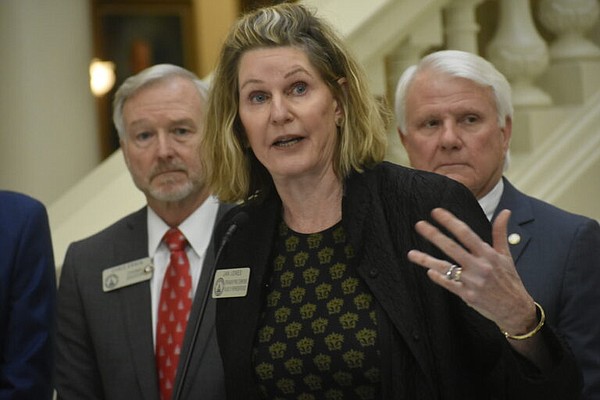A new report on U.S. preschool programs ranks Georgia 9th in the nation in enrollment for 4-year-olds at 56%, but ranks 25th in state spending per child at $5,646.
Researchers at the National Institute of Early Education found Georgia meets 8 out of 10 quality standards, increasing preschool spending by nearly $100 million pending Gov. Brian Kemp's signature By doing so, he predicted the Georgia youth would get off to a good start.
Class sizes and child-to-staff ratios kept the state from achieving a perfect score, according to the institute's 2023 State Preschool Yearbook released Thursday. The authors noted that Georgia's maximum class size of 22 students exceeds the standard of 20, and the staff-to-child ratio is 1:11 (versus the recommendation of 1:10). Five states met all 10 criteria, including requirements. These include teacher training and professional development, and student vision and hearing testing. The five states are Alabama, Hawaii, Michigan, Mississippi, and Rhode Island.
Georgia lawmakers increased the allowed class size from 20 to 22 students for the 2012 school year in response to the Great Recession. The 2025 budget that lawmakers approved last month aims to fix that problem by adding $97 million to the lottery funding program. Kemp has until May 7 to consider and sign the bill, including the budget.
House Speaker Pro Tem Jean Jones, R-Milton, chaired a task force on early childhood education last year and led the push for more funding. The $97 million could help restore class sizes to 20 students and meet other pre-K priorities, including increasing teacher pay, increasing start-up grants and transportation assistance.
(Read more: Georgia Senate says no to last-minute special interest tax cut)
Restoring class sizes would mean increasing the number of preschool classrooms in the state from 3,818 to 4,200, at an estimated cost of $43 million over four years, according to the task force.
“We commend Georgia’s leaders for supporting a comprehensive package of research-based reforms to improve Georgia’s groundbreaking preschool program for generations to come. By restoring class sizes to levels recommended for excellent student outcomes, Georgia's preschool program will be the largest in the state.'' “This is a national program that meets the needs of the public,” said W. Stephen Barnett, senior co-director of the institute.
“A key element in making preschool effective are strong teachers who interact with children one-on-one or in small groups,” he added. “That's even more so when class sizes are limited to her 20 students. Research shows that this leads to long-term outcomes for students.”
The report gave a positive rating for the effectiveness of Georgia's program, citing a longitudinal study released last spring that followed children from preschool through fourth grade.
(Read more: Legislature sends bill to governor's desk to guarantee livable housing for Georgia renters)
“Children who attended kindergarten in Georgia had better language, literacy, and executive function in fourth grade than children who did not attend kindergarten,” the report states. “Overall, the results suggest that a major strength of Georgia's preschool programs is building foundational literacy skills for reading comprehension.”
Georgia's preschool program began in 1992 as a limited pilot program with the creation of the Georgia Lottery. Three years later, the program expanded to become the first universal preschool program in the country for her 4-year-olds.
In the 2022-23 school year, 73,462 children enrolled in preschool with $388.3 million in state funding and an additional $26.4 million in federal recovery funds.
For more information, visit GeorgiaRecorder.com.


